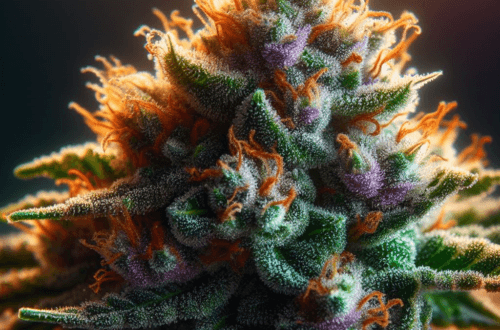Struggling with weight loss can feel like an endless rollercoaster. There’s no shortage of diets, supplements, and exercise regimes out there, but what if a natural compound could be the missing piece?
Enter CBD, or cannabidiol, a non-psychoactive compound derived from hemp plants. This little powerhouse could potentially change the game for weight loss enthusiasts.
But how does CBD work its magic? And is there any science to back up the buzz? Let’s dive into the potential benefits, the science behind it, and how you might incorporate CBD into your wellness routine to support weight loss.
How Does CBD Interact with the Body’s Endocannabinoid System for Weight Management?
Understanding how CBD supports weight loss starts with the body’s endocannabinoid system (ECS). The ECS is like a regulatory hub that helps maintain balance and harmony within the body.
CBD interacts with the ECS by engaging with its receptors, specifically CB1 and CB2. These receptors are found throughout the body, including the brain, immune cells, and digestive system.
Research suggests that overstimulated CB1 receptors may be linked to obesity. CBD potentially deactivates these receptors, which could in turn reduce appetite and food consumption.
Additionally, CBD promotes the production of certain proteins and genes that enhance the breakdown of fat. It may also help convert white fat (bad fat) into brown fat (good fat), which is easier for the body to burn.
On top of that, CBD can impact stress levels and improve sleep quality, both of which are crucial for weight management. By reducing stress and enhancing sleep, CBD may prevent overeating and support a healthier lifestyle.
Incorporating CBD into your wellness routine could be more than just a trend—it’s a holistic approach to achieving your weight loss goals.
Can CBD Help Reduce Body Weight by Aiding in Fat Browning Processes?
So, what exactly is fat browning, and how does it relate to CBD? Let’s dive into that!
Fat browning is the process of turning white fat cells, which store energy, into brown fat cells, which burn energy. This process is beneficial because brown fat is more metabolically active and can help burn more calories.
Studies indicate that CBD can stimulate these fat-browning processes. This means it encourages the conversion of undesirable white fat into the more energy-efficient brown fat.
The Role of Mitochondria
One of the ways CBD aids in this transformation is by enhancing the activity in mitochondria, the powerhouse of cells. The increased mitochondrial activity boosts the body’s ability to burn calories at a higher rate.
Additionally, CBD has been shown to escalate the expression of certain proteins involved in this browning process. These proteins can trigger the body to generate more brown fat, thereby increasing overall energy expenditure.
CBD’s role in fat browning is an exciting avenue in weight management research. By promoting the conversion of fat types, CBD could offer a unique and natural way to help you reach your weight loss goals.

Exploring the Potential of CBD in Suppressing Appetite and Managing Cravings
Have you ever wondered how CBD might help curb those pesky cravings? Let’s explore how it works!
CBD interacts with the body’s endocannabinoid system (ECS), which plays a significant role in regulating food intake and energy balance. Unlike THC, which can stimulate appetite, CBD may have the opposite effect.
Mood and Appetite
One fascinating aspect is how CBD can influence appetite through mood regulation. Stress and anxiety often lead to emotional eating. CBD’s calming effects could help reduce stress levels, potentially decreasing the urge to snack impulsively.
Additionally, CBD might affect specific brain receptors involved in hunger signals. By modulating these receptors, CBD could help suppress the feeling of hunger, making it easier to stick to a balanced diet.
Another interesting point is that CBD can help stabilize blood sugar levels. When blood sugar is balanced, you’re less likely to experience sudden cravings for sugary or high-carb foods.
While more research is needed, the existing studies provide a promising glimpse into CBD’s potential to help manage appetite and cravings. If you’re looking for a natural way to support your weight management journey, CBD could be worth considering.
The Role of CBD in Reducing Inflammation and Supporting Metabolic Health
Inflammation is like your body’s emergency response team, but sometimes it goes overboard and leads to chronic issues. This is where CBD could come in handy.
CBD is known for its anti-inflammatory properties. When you take CBD, it interacts with the ECS, helping to regulate immune responses. This can reduce inflammation, which is beneficial for overall health and particularly for conditions like arthritis.
Benefits for Metabolic Health
Now, let’s talk metabolism. A sluggish metabolism can make weight management a real challenge. CBD might support metabolic health by influencing fat browning, the process where white fat (the bad kind) is converted into brown fat (the good kind). Brown fat burns calories more efficiently, aiding in weight loss.
Additionally, chronic inflammation is often linked to metabolic disorders like diabetes. By reducing inflammation, CBD could help improve metabolic functions, making it easier to maintain a healthy weight.
It’s also interesting to note that CBD may improve how your body processes insulin. Better insulin sensitivity means more stable blood sugar levels and less fat storage—a win-win!
While more research is essential for a complete picture, the current findings suggest that CBD could be a valuable tool for reducing inflammation and boosting metabolic health. If you’re looking into holistic ways to support your well-being, CBD offers exciting possibilities.
Understanding the Effects of CBD on Stress and Anxiety Levels to Aid Weight Loss Efforts
Stress and anxiety can be major roadblocks on the path to weight loss. When you’re stressed, your body releases cortisol, a hormone that can cause weight gain, especially around the midsection.
CBD may help here by interacting with receptors in your brain that regulate mood. Studies have shown that CBD can reduce stress and anxiety levels, making it easier to stick to your weight loss goals.
When you’re less stressed, you’re less likely to engage in emotional eating. This means fewer impulsive trips to the fridge for comfort food.
Additionally, better sleep is another perk of reduced anxiety. Quality sleep is crucial for weight loss because it balances hunger hormones and supports metabolic processes. So, CBD could indirectly help you shed those extra pounds by improving your sleep quality.
By helping to keep stress and anxiety at bay, CBD provides a more balanced, serene state of mind, which is essential for maintaining a healthy lifestyle and achieving weight loss success. If you’re struggling with stress-related eating habits, CBD might be worth considering as part of your wellness routine.
How Can CBD Help Improve Sleep Quality for Enhanced Weight Management?
Sleep is a cornerstone of good health, especially when it comes to managing weight. When you sleep well, your body can repair itself and regulate critical hormones that control hunger and metabolism.
CBD has been shown to improve sleep quality by addressing different sleep-disrupting issues. For example, it helps reduce anxiety, which can keep your mind racing at night and prevent you from falling asleep.
A Calming Effect
Also, CBD has a calming effect on the nervous system. It can alleviate pain and decrease the symptoms of sleep disorders like insomnia or REM sleep behavior disorder. This means a more restful night for you.
Improved sleep quality directly impacts weight management. When you’re well-rested, you’re less likely to crave sugary and fatty foods. Your body can maintain a better balance of hunger hormones like leptin and ghrelin, making it easier to stick to your diet.
Also, good sleep boosts your energy levels, making it easier to stay active and burn those extra calories.
By incorporating CBD into your routine, you might find yourself sleeping better and managing your weight more effectively. Quality sleep is more than a luxury; it’s an essential part of a healthy lifestyle.
Unveiling the Possibilities of CBD in Combating Obesity and Related Health Conditions
Obesity isn’t just about weight; it’s linked to various health conditions like diabetes, cardiovascular diseases, and even certain types of cancer. Could CBD help tackle this pervasive issue?
CBD affects the body’s endocannabinoid system, which plays a role in regulating appetite and metabolism. Early research suggests that CBD can help convert white fat, the type we store during weight gain, into brown fat. Brown fat burns calories and generates heat, aiding in weight loss.
Managing Inflammation
Obesity often goes hand-in-hand with chronic inflammation. Thankfully, CBD is known for its anti-inflammatory properties. By reducing inflammation, CBD can improve overall health and potentially help those who are overweight avoid related health complications.
Additionally, CBD may positively affect insulin sensitivity. Improved insulin sensitivity means your body can better manage blood sugar levels, reducing the risk of diabetes, a common concern for those struggling with weight issues.
One of the lesser-known benefits of CBD is its potential to reduce stress eating. By curbing anxiety and stress, CBD can help you maintain a healthier relationship with food, further aiding in weight management.
Incorporating CBD into your wellness routine could offer a multi-faceted approach to combating obesity and enhancing overall health. As always, it’s important to consult with a healthcare provider before starting any new supplement.
Examining the Potential Risks and Considerations When Using CBD for Weight Loss Goals
While the possibilities of CBD in combating obesity sound promising, it’s crucial to consider the potential risks and factors before diving in.
First and foremost, the CBD industry is still relatively new, and regulations are playing catch-up. This means product quality can vary significantly. Always opt for products that have been third-party tested for purity and potency to ensure you’re getting a reliable and safe CBD product.
It’s also worth noting, that everyone’s body reacts differently to CBD. What works wonders for one person might not have the same effect on another. Start with a low dose to see how your body responds, and gradually increase if necessary. Keeping track of any changes or side effects can help you gauge its effectiveness.
Consult with a Healthcare Provider
It’s also essential to consult with a healthcare provider before starting CBD, especially if you’re on other medications. CBD can interact with various drugs, altering their effectiveness or causing side effects. A healthcare professional can offer guidance tailored to your specific health needs and circumstances.
Another point to consider is that CBD isn’t a magic bullet for weight loss. It should complement a balanced diet, regular exercise, and other healthy lifestyle choices. Relying solely on CBD while neglecting other aspects of a healthy lifestyle may not yield the results you’re hoping for.
Lastly, while CBD appears to have a good safety profile, long-term studies are still needed. Understanding the potential long-term effects is crucial as you decide whether to incorporate it into your weight loss strategy.
In conclusion, while CBD shows promise for weight loss and managing related health conditions, it’s essential to approach it thoughtfully and cautiously. By staying informed and consulting healthcare providers, you can make the best decisions for your health journey.






